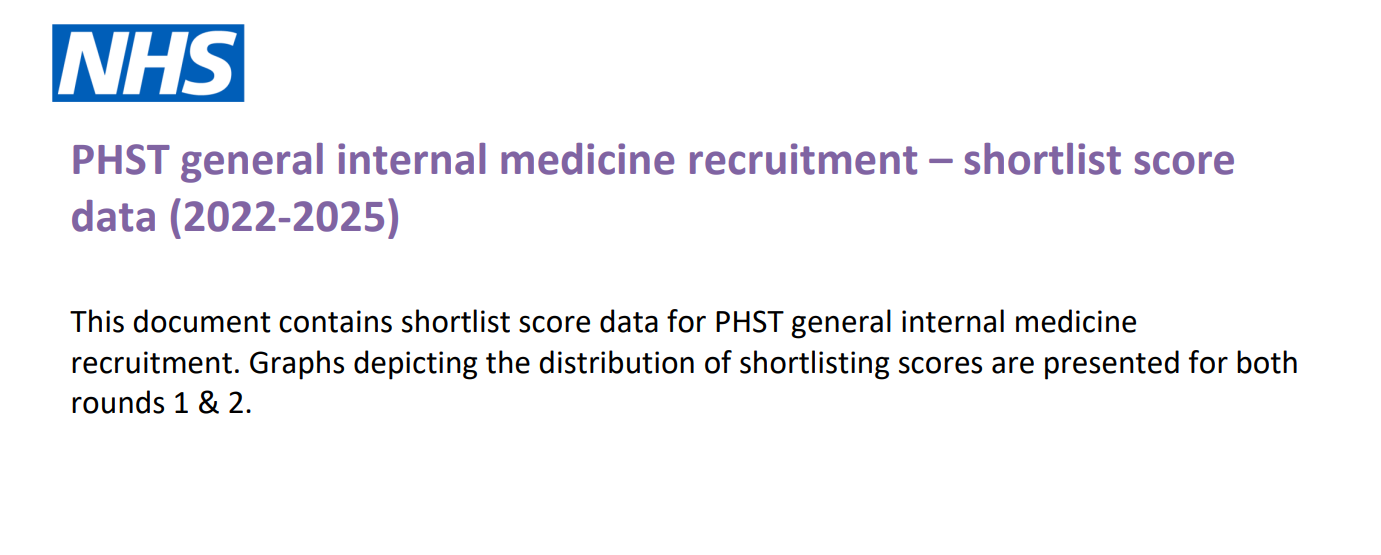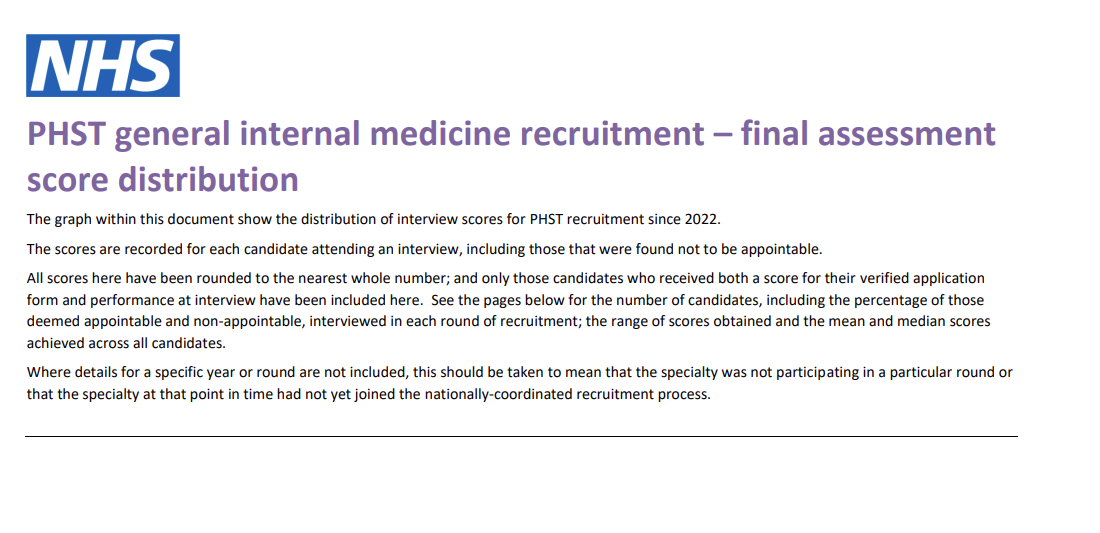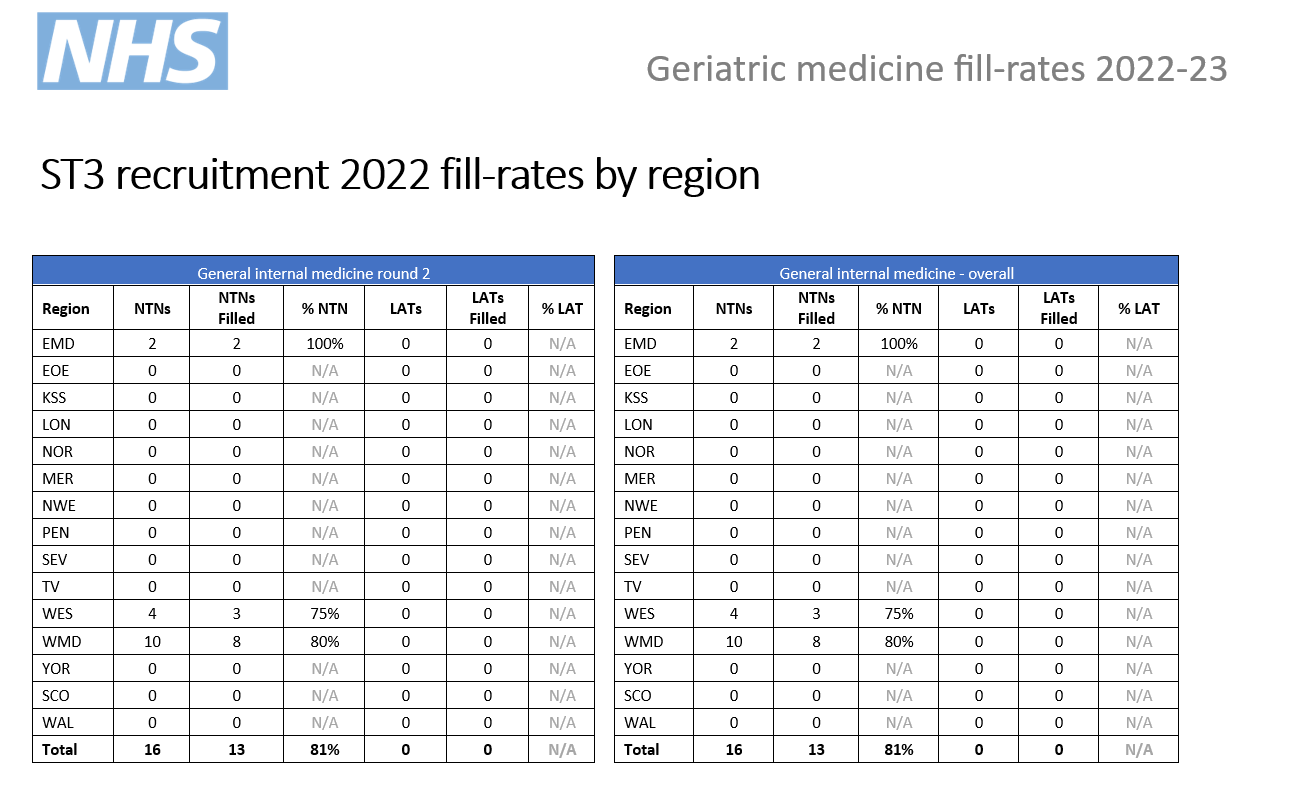In most cases you do not apply directly to general internal medicine (GIM) at ST4 level. Training in GIM will be done in parallel with training in one of the Group 1 physician specialties and access to ST4 training is gained by applying for one of these specialty programmes. Group 1 programmes offer dual accreditation in the specialty and GIM.
The Group 1 programmes which dual accredit with GIM are acute internal medicine, cardiology, clinical pharmacology and therapeutics, endocrinology and diabetes, gastroenterology, geriatric medicine, genitourinary medicine, infectious diseases, neurology, palliative medicine, renal medicine, respiratory medicine and rheumatology.
However, there are two additional routes to training in GIM: single accredited GIM, and single accredited GIM with stroke medicine sub-specialisation.
Single-accredited GIM recruitment
A programme for single accreditation in general internal medicine is available. Currently, recruitment covers most, but not all, regions in England; although this may expand over time so please check the post numbers area of this page before the start of each round. The other tabs in this area of the website relate to the application and interview process for single accredited GIM.
The specialty
The current GIM curriculum is designed to provide broad training in the key skills which will be required by consultants taking part in the admission and inpatient management of patients with acute medical problems as well as patients with chronic medical conditions.
The curriculum builds on IMT to allow the trainee to maturate their skills in GIM.
There is a growing demand for high quality GIM skills as the UK population ages and patients develop multiple, complex co-morbidities. Delivering good GIM care will become an increasingly challenging and rewarding part of physician practice.
Further information
General / application queries
For general queries relating to areas such as eligibility criteria, making an application or the Oriel system, please contact the Physician Specialty Recruitment Office.
Below are the contact details for the lead region for GIM.
| Midlands | |
| General enquiries | Support : midlands.freshdesk.com |
Group 1 specialty
This is a Group 1 specialty and requires completion of the internal medicine training (IMT) stage 1 programme or equivalent.
Therefore, this specialty uses the standard HST eligibility criteria for Group 1 specialties and does not accept candidates from any alternative training routes. Please visit the am I eligible? section of this website for further information.
Expected to participate in round 2
This specialty has traditionally participated in the second round. Although it cannot be guaranteed until the first round is completed, it is very likely that there will be a second round for this specialty this recruitment year. Participation in the second round is confirmed in June each year.
Commitment to specialty
The specialty will be assessing your commitment to specialty as part of the shortlisting process. Please visit the application scoring page for more information about how this is assessed and scored.
Indicative post numbers
Indicative vacancy numbers are available in the table below, broken down by region and divided between substantive national training number (NTN) and locum appointment for training (LAT) posts. In many cases these will be presented as a range (e.g. 1-4) as it is not always possible for regions to know at this stage how many vacancies there will be.
It is the intention that indicative post numbers for all regions will be published prior to the application opening date, although this cannot be guaranteed. Please note that this table is not likely to be updated subsequent to indicative numbers and actual numbers will be confirmed when programme preferences are opened later in the round.
Numbers subject to change
Please be aware that it is not uncommon for vacancy numbers to change as the round progresses.
More commonly, post vacancy numbers can increase as the round goes on (and confirmation of posts becomes available); but it is also possible that numbers can reduce as well. In the past, post numbers have risen an average of 20-40% from the start to the finish of the round but this can vary greatly for individual specialty/region combinations.
It is possible that regions which do not have a post at the start of the round may declare one after applications have closed. Whilst we try and minimise instances of this, it is not always possible to predict vacancies so even if there appears not to be a vacancy in your preferred specialty/region combination, you may wish to consider applying in case one becomes available during the round; you can check with the region concerned if you wish to check on the likelihood of a post arising.
Generally, once a region enter a post into a round they would always have at least one post available and would only withdraw it in exceptional circumstances.
Week commencing 22 December 2025 11, 12 March 2026 North West 0 - 1 Mersey 0 Peninsula 1 - 2 Severn TBC *Verification was originally 18/12/25 - 05/01/26Round 1 Interview dates & posts
Region
NTN posts
Evidence upload date(s) Interview date(s)
East Midlands
4 - 6
East of England
0
London
TBC
Kent, Surrey & Sussex
0 - 3
North East
0 - 1
North West
South West
Thames Valley
0
Wessex
0 - 5
West Midlands
4 - 6
Yorkshire & Humber
TBC
Interview content
The interview be split across two separate stations with a separate pair of interviewers scoring you on the areas within their station. There will be four questions, ranging between 6-10 minutes in length. You will be marked on these questions and your communication skills, giving five scored areas in total. The headings below show the question areas and in which station they will be covered, along with information about what will be assessed.
Each station will last 16 minutes, so, including the time between stations, the interview will be approximately 40-45 minutes.
Please note that this is subject to change and will be confirmed by the date of interview.
At the start of this question you will read a clinical situation to consider. Interviewers will provide you with some information about a patient to ask for your initial response and will follow this up with a series of follow-on probes relating to the diagnosis and management of this case. This question will last approximately 8 minutes.
Clinical scenario considerations
The scenario will describe a hypothetical clinical situation which has arisen in which you are, or have become, involved. Some points to consider when reviewing the scenario and preparing for discussion are:
- what steps you would take
- any potential treatments possible
- any further information you would gather
- how you would go about communicating with any people (eg patients, family members, colleagues) involved in the scenario
You should also consider any other factors you deem appropriate, using your experience and professional judgement.
Areas for assessment
One mark will be awarded to you based on your suggestions and responses to the clinical scenario. The second mark will be on the communication skills you display.
This will be both an assessment of how you would communicate with patients, colleagues, etc. in the scenario, as well as of how well you communicate with interviewers.
This question will focus on your suitability for and commitment to higher specialty training in the specialty and give you opportunity to expand on the information provided in your application form.
This question will last approximately 8 minutes.
This question will see you given an ethical scenario to review. As with the clinical scenario, this ethical scenario takes the form of a hypothetical situation, described briefly in text form, details of which will be given to you before discussion. You will have a short while to review the scenario and there will be approximately 6 minutes of discussion afterwards.
This scenario focuses less on a clinical situation, and deals more with consideration of the moral, ethical, legal (etc.) issues which may arise in a situation.
The area of assessment here will be your suggested responses to the ethical scenario during discussion, as well as your knowledge of the different considerations required.
This question will explore the non-clinical aspects of being a medical registrar, focusing on two of the Capabilities in Practice (CiPs) from the Internal Medicine Stage 1 Curriculum:
- Managing an acute unselected take
- Managing a multi-disciplinary team including effective discharge planning
You are required to start the station with a one-minute presentation: ‘A summary of your experience managing the acute unselected medical take as the medical registrar.’ In describing your experience, your presentation should summarise the following:
- The roles and duration you have undertaken in this capacity
- The level of responsibility you have held, and the degree to which you have been supervised
- The size and profile of the multi-disciplinary teams you have managed
- The number of patients for which you were directly and indirectly responsible whilst leading the acute unselected medical take
- Outline of the non-clinical duties you have performed in the role.
Following your presentation, interviewers may ask questions to clarify or ask you to expand upon your experience.
The remaining time in the station will ask you to draw on your experience of managing a team caring for acute medical admissions by giving examples of how you have managed different situations.
This question will last approximately 10 minutes.
Presentation guidance
When preparing your presentation, please bear in mind the points below:
- Give headlines and brief descriptions to maximise the time available.
- Ensure your presentation is clear and well-structured.
- One-minute time limit - Your presentation must last for no more than one minute, and you will be stopped at this point.
- No aids/resources allowed – you are not allowed to use any visual representations, such as PowerPoint, when giving your presentation and you must not share your screen. You are welcome to use notes, but these should be for your own use only.
Scoring framework
The score of 1-5 an interviewer will award you for each assessment area is judged in relation to how well you perform against an expected level. Below is the framework used to award scores at interview, as well as interpretation of what these scores represent:
|
Mark
|
Rating
|
Assessment
|
|
1 |
poor |
not considered appointable |
|
2 |
area for concern |
performed below the level expected from a core level trainee applying to the specialty; |
|
3 |
satisfactory |
performed at the level expected of a core level trainee applying to the specialty; |
|
4 |
good |
above average ability; |
|
5 |
excellent |
highly performing trainee; |
As shown in the table, for each of the question areas at interview, 3/5 is considered a satisfactory score; and reflects the level of performance that would be expected of a trainee ready to progress to a specialty training programme.
Should your performance go above and beyond this expected level, interviewers can award marks of 4/5 or 5/5 as appropriate.
Conversely, should your interview performance not reach the expected level, then interviewers can award marks of 1/5 or 2/5, as reflects their level of concern over your performance.
Appointability
Raw interview score (RIS)
The RIS is the sum of all ten scores awarded to you during your interview, but before any weighting is applied.
As each individual score will be between 1 and 5, your RIS will be between 10 and 50.
Appointability requirements
To be classed as 'appointable', you must meet all three criteria below:
- none of your ten interview scores can be 1/5
- no more than two of your ten interview scores can be 2/5
- your RIS must be 30 or above.
If you meet all three requirements, your application will be assessed as appointable, and can progress to be considered for post offers.
However, if you fail to meet any of these requirements, your application must then be assessed as not appointable, and it will progress no further in that round.
Total score
After interview, a weighting is applied to the scores in each area, as well as your application score.
These scores are then combined to give your total score which determines your ranking, which will in turn be used to inform how offers are made. The weighting of different sections, as well as the method by which your total score is established, is detailed in the table accessible through the link below:
|
|
Interviewer 1
|
Interviewer 2
|
Weighting
|
Max score
|
|
Station 1 - Question 1 |
||||
|
Clinical scenario |
/ 5 |
/ 5 |
2.0 |
20 |
|
Communication mark |
/ 5 |
/ 5 |
1 |
10 |
|
Station 1 - Question 2 |
||||
|
Suitability and commitment |
/ 5 |
/ 5 |
2.0 |
20 |
|
Station 2 - Question 1 |
||||
|
Ethical scenario |
/ 5 |
/ 5 |
1.5 |
15 |
|
Station 2 - Question 2 |
||||
|
Medical registrar suitability |
/ 5 | / 5 | 1.5 | 15 |
|
Raw interview score |
/ 50 |
|||
|
Interview score (w weighting) |
/ 80 |
|||
|
Application score |
/ 40 |
0.5 |
/ 20 |
|
|
Total score |
/ 100 |
|||
As part of the process of applying to HST, you may wish to gain an idea of how recruitment progressed in previous years for the various specialties participating in the nationally-coordinated recruitment.
As the standalone GIM programme was a pilot in 2022, we only have data for one round of recruitment.
-
Competition ratios - application numbers submitted to each specialty, along with the number of NTN and LAT posts available in each. It is worth noting that posts are subject to change throughout the round (increasing on average between 20-40%), and post numbers for this data are taken at the end of the round.
-
Shortlist scores - the scores awarded to all submitted applications, including average scores and distribution nationally.
-
Total scores - the total score awarded to all candidates who completed the full recruitment process for a specialty (application and interview), including some analysis of scores.
-
Post fill rates - the number of posts filled by region.
We have published information for all specialties participating in our process that year; consequently not all specialties will have data in all cases.
Round 1
| Year | Apps. | NTN posts | LAT posts | Total posts | Comp. | Unique* |
| 2025 | 191 | 21 | 0 | 21 | 9.09 | 3% |
| 2024 | 145 | 36 | 0 | 36 | 4 | 2% |
| 2023 | 103 | 29 | 0 | 29 | 3.6 | 5% |
*the percentage of unique candidates that only applied to this specialty (out of the PSRO-coordinated specialties)
Round 2
| Year | Apps. | NTN posts | LAT posts | Total posts | Comp. |
| 2024 | 85 | 11 | 0 | 22 | 3.9 |
| 2023 | 102 | 14 | 0 | 14 | 7.2 |
| 2022 | 98 | 16 | 0 | 16 | 6.1 |




